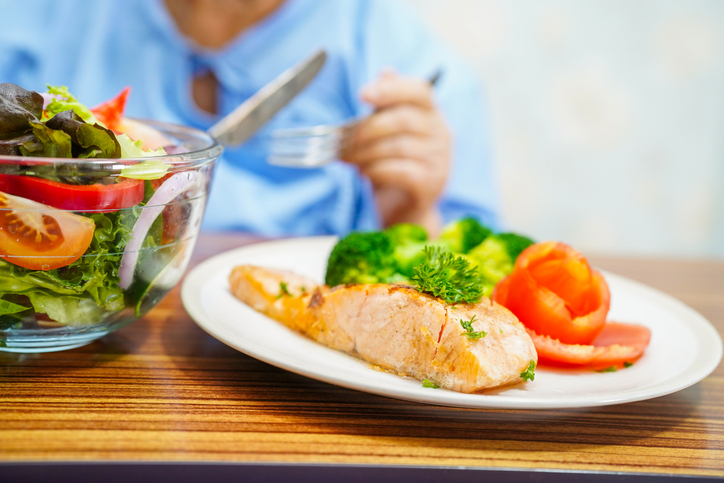
The ongoing COVID-19 pandemic has brought a whole new host of challenges to the health and wellbeing of the population. One of those concerns is post-viral fatigue. Fatigue is a common part of the body’s response to fighting a viral infection and often continues for some time after the infection has cleared (Royal College of Occupational Therapists, 2020). Individuals suffering from fatigue may sleep more, have difficulty standing for long periods, and notice a decline in their concentration or memory (Royal College of Occupational Therapists, 2020).
As a nutrition professional today, you may encounter clients who are battling the residual effects of COVID-19. In those cases, precautions need to be taken to help clients monitor and manage their energy levels (Bains, 2021). Nutrition should be a top priority when it comes to supporting the general health and wellbeing of the body. Read on to learn how you can assist clients with their post-Covid recovery.
Post-Covid Nutrition Concerns
Post-viral fatigue is a common concern for anyone recovering from COVID-19. Post-viral fatigue can make any physical activity – including ordinary daily activities – significantly challenging (Musker, 2020). Other manifestations of fatigue include bodily pain, altered sleeping patterns, stress, muscle soreness, and breathlessness (Bains, 2021). Along with reduced physical capacity, the side effects of COVID-19 can also result in malnutrition (Alberta Health Services, 2021).
As students in a nutritionist program will learn, past physical trauma and other challenges to the body can make it difficult to follow nutritional guidelines that will benefit the body’s recovery and health. Malnutrition is a common side effect of illnesses such as COVID-19 (Alberta Health Services, 2021). Patients may experience a loss of muscle mass as a result of decreased caloric and protein intake, particularly those who were hospitalized in critical care (Alberta Health Services, 2021). A Nutrition Professional should pay attention to these concerns and be able to assist clients in their mental and physical recovery.
Strategies for Fighting Fatigue
Eating, drinking, and meal preparation are all energy-consuming activities that could require more physical effort than post-Covid patients are able to exert (Alberta Health Services, 2021). For someone suffering from post-viral fatigue, a simple act like chewing can be exhausting. In that case, fatigue can impact how well clients are able to nourish themselves.
Those with a nutrition diploma should work with clients to find practical solutions to improve their meal preparation and eating habits throughout the day. Practical strategies to reduce energy expenditure include eating smaller meals throughout the day, modifying food textures to limit chewing, and taking oral nutrition supplements (Alberta Health Services, 2021). If possible, it’s a good idea for clients to maintain their normal routine for eating and drinking (Royal College of Occupational Therapists, 2020). Since illness can cause dehydration, post-covid patients should also focus on maintaining their fluid intake throughout the day.
How You Can Advise Clients After Nutritionist School
A nutrition professional should help clients develop nutrition plans that will motivate them to stay on track for a strong recovery. Making mindful food choices is the first step to managing low energy levels and improving one’s overall health. Foods such as spinach, legumes, and seeds contain high quantities of iron that can help to boost energy levels and ward off lethargy (Bains, 2021). Eggs are another good option, offering a rich source of protein that can enhance muscle and bone strength in clients (Bains, 2021).
By contrast, processed foods contain a lot of simple carbohydrates that can have an unstable effect on the body’s blood sugar, driving mood swings and lowering energy levels (Naidoo, 2020). By targeting specific deficiencies in their client’s diet, a nutrition professional can promote the physical and mental recovery of clients suffering from post-Covid symptoms.
Are you interested in attending nutritionist school?
Contact Rhodes Wellness College today!
Works Cited:
Alberta Health Services (2021). Nutrition Guideline Post-COVID-19: Nutrition for Recovery and Rehabilitation (Adults). Retrieved from https://www.albertahealthservices.ca/assets/info/ppih/if-ppih-covid-19-post-covid-19-nutrition-for-recovery-and-rehab-adults.pdf
Bains, G. (2021). 5 foods to beat post-Covid fatigue. Retrieved from https://www.healthshots.com/healthy-eating/nutrition/5-fab-foods-to-beat-post-covid-fatigue/
Musker, M. (2020). What is post-viral fatigue syndrome, the condition affecting some COVID-19 survivors?. Retrieved from https://theconversation.com/what-is-post-viral-fatigue-syndrome-the-condition-affecting-some-covid-19-survivors-146851
Naidoo, U. (2020). Eating during COVID-19: Improve your mood and lower stress. Retrieved from https://www.health.harvard.edu/blog/eating-during-covid-19-improve-your-mood-and-lower-stress-2020040719409










